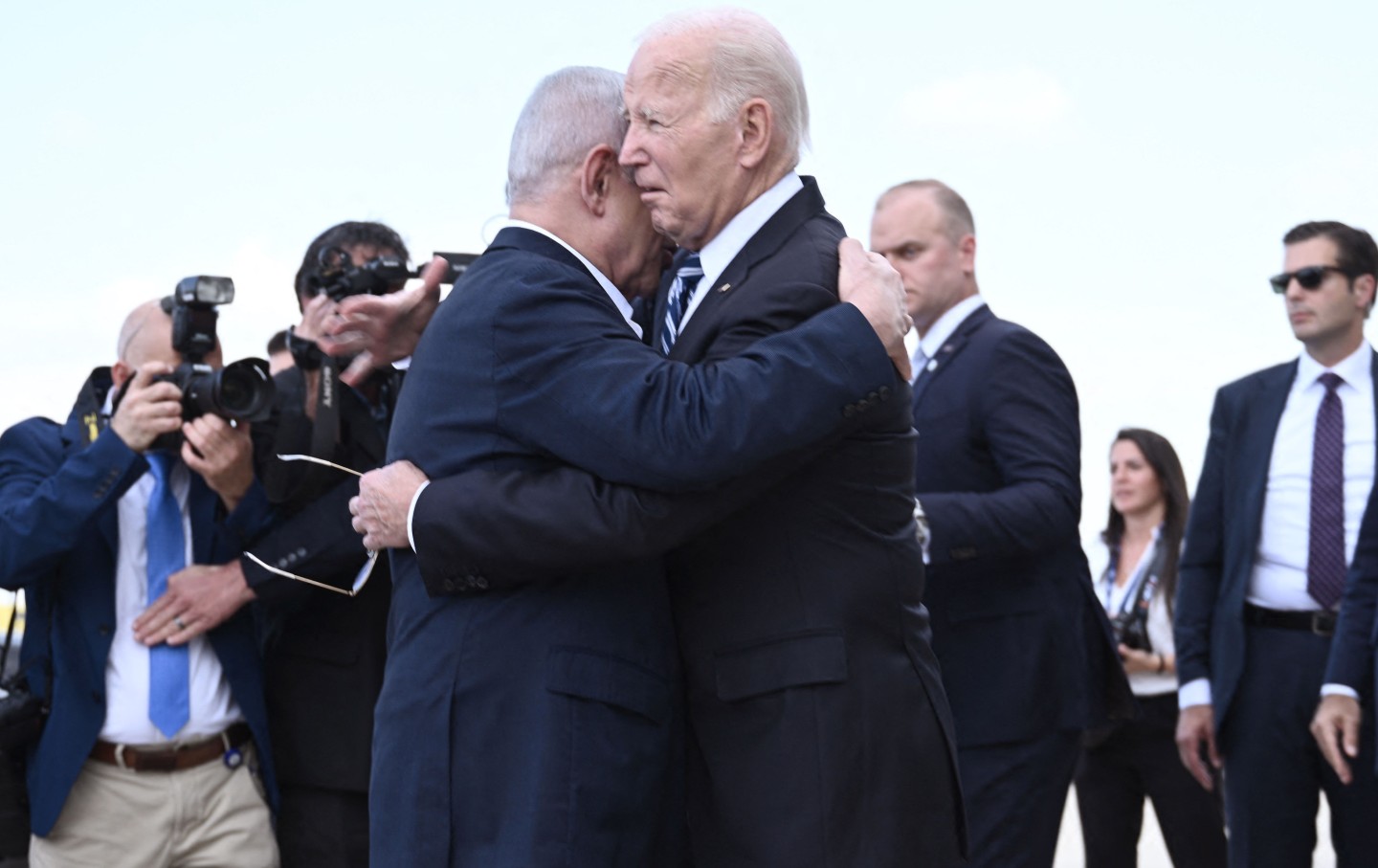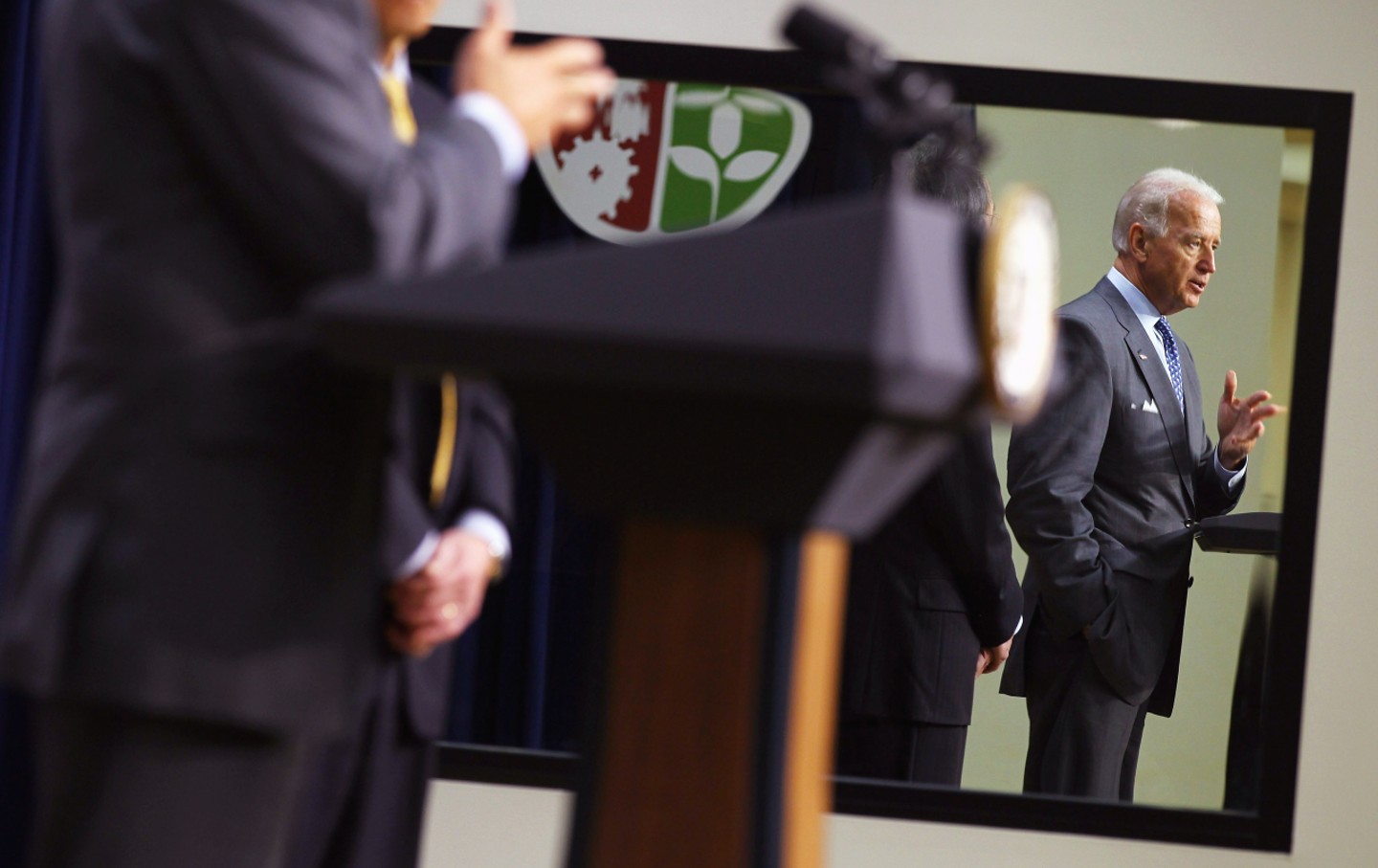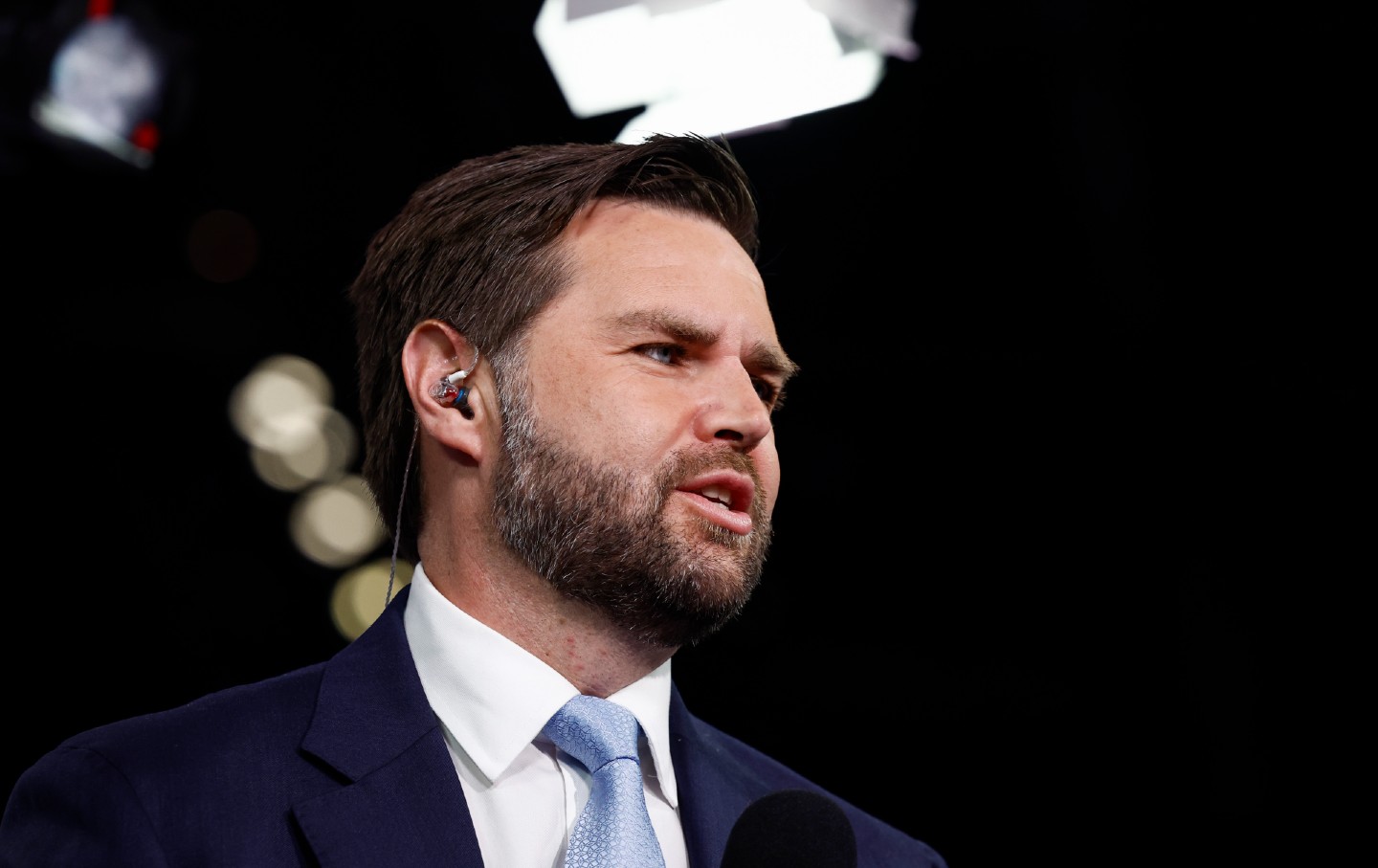Will Benjamin Netanyahu Drag America Into a Big Middle Eastern War?
Biden is for pushing de-escalation—but Israel could still go rogue.

On Sunday, NBC News carried a remarkable report on Joe Biden’s contradictory response to the recent escalation in the Middle East, which started on April 1 when Israel bombed an Iranian consulate in Damascus (killing 16 people including an Iranian brigadier general). This was followed by Iran’s launch of missile and drone attacks on Israel in Saturday (with almost all the incoming projectiles thwarted by anti-missile systems, resulting in no deaths and only one person seriously injured). According to NBC, “President Joe Biden, who has publicly reinforced his administration’s ‘ironclad’ commitment to Israel’s defense, has privately expressed concern that Israeli Prime Minister Benjamin Netanyahu is trying to drag Washington into a broader conflict, three people familiar with his comments said.”
The NBC report quoted a “senior defense official” who described the Israeli attack on the consulate as “catastrophically escalatory.” The official added, “I don’t think they had a strategy. Israelis don’t always make the best strategic decisions.”
To anyone committed to coherent policymaking and even elementary logic, this report raises a serious question: Why would Biden publicly promise “ironclad” support for a nation he also (albeit privately) thinks is trying to drag the United States into catastrophic war, one which could easily destroy Biden’s presidency as well lead to countless deaths?
In truth, this public/private dichotomy is a familiar Biden tactic. Since the start of the current Middle Eastern crisis with the October 7 attack, Joe Biden has been speaking out of both sides of his mouth, saying one thing in private while doing and talking differently in public. The usual formula has been for Biden to express private “frustration” and “concern” over the enormous number of Palestinian civilian causalities while being much more muted in his public criticism and continuing to offer Israel a blank check of military aid and diplomatic protection. Thus, on October 10, 2023, the New York Post reported, “President Biden privately urged Israeli Prime Minister Benjamin Netanyahu to minimize civilian casualties.” This urging had absolutely no impact. Another typical example came a few months later in a NBC report from February 12 that stated, “Biden disparages Netanyahu in private but hasn’t significantly changed U.S. policy toward Israel and Gaza.”
This two-faced policy is an outgrowth of Biden’s “bear-hug” strategy with Israel, where he closely embraces the Jewish state, offering it nearly unlimited support, in the hopes that this closeness will give him the leverage to persuade Israel to make a settlement with the Palestinians and to avoid launching a larger regional war.
I argued last December that this strategy was a disaster, since it has only emboldened Netanyahu’s dangerous policies of punitive warfare against the civilians of Gaza combined with provocative attacks on Iranian allies in Lebanon, Syria and elsewhere. Fawaz Gerges, an international relations professor at the London School of Economics, made the same point to to NBC:
“The strategy of the Biden administration has failed miserably. Biden is sleepwalking the U.S. into another catastrophic war in the Middle East. His overarching goal of preventing the war in Gaza from escalating into neighboring countries has failed,” Gerges said. “Biden has failed to influence Netanyahu’s decisions either in Gaza or towards Iran.”
Yet, if the Biden administration’s carte blanche to Israel helped created the current disaster, the White House deserves credit now for pursuing a policy of de-escalation. Notably, the White House has strengthened back channels to Iran, which were of immense help in making sure that Iran’s counter-attack was carefully calibrated (tellingly, the Iranians only targeted military sites). After the attack, Biden also took a conciliatory approach, emphasizing the lack of damage done to Israel. Reuters reports, “President Joe Biden warned Prime Minister Benjamin Netanyahu the U.S. will not take part in a counter-offensive against Iran.” In other words, Biden is, if only privately, insisting that the United States will not be dragged into the large-scale Middle Eastern War that Netanyahu wants.
Writing on Twitter (now called X), Suzanne DiMaggio, a fellow at the Carnegie endowment, noted:
Official and unofficial US-Iran back channel diplomacy since the Damascus strike on April 1 helped to prevent this crisis from spiraling out of control.
Consistent messaging across multiple channels clarified each side’s thinking, spelling out intentions and redlines.
Early on the US made clear that it was not involved in the strike. Iran informed the US that retaliatory measures were inevitable, relaying the nature and scope of the response over time.
While urging restraint, a clear redline for the US was no targeting of US forces or facilities. For Iran, a redline was no direct US involvement in any response by Israel. Biden telling Netanyahu the US will not participate in any offensive operations against Iran is notable.
Greg Brew, an analysist at the Eurasia Group, had a parallel assessment. He noted that back channels were also used to avoid escalation after Iran responded to the Trump administration’s assassination of their military commander Qasem Soleimani in 2020. Brew notes, “As with the Soleimani counterstrike, Iran may have used Iraq to alert US of a coming strike. Helps explain why US had specific (and accurate) intel re: what Iran was planning to do, and was able to get defense assets in place in time.”
Biden deserves credit for his administration’s deft back channel diplomacy and also for rallying the G7 nations to release a measured statement that, while rebuking Iran, emphasized the need for de-escalation and also included a pointed push for a cease-fire in Gaza along with more humanitarian aid. The subtext of the G7 message was that the United States and its major allies do not want to be dragged into a large Middle Eastern war.
The United States and Iran set up back channels so Iran could perform retaliation while minimizing the risk of retaliation. Both the United States and Iran are clearly interested in avoiding a larger war. The same cannot be said of Israel—at least under Prime Minister Benjamin Netanyahu.
The worrying truth is that Netanyahu, and perhaps other senior Israeli officials, have every incentive to keep pushing for a regional war. For Netanyahu, as long as the war continues, he can stay in office and avoid the inevitable backlash for his political corruption and for the intelligence failures that led to the October 7 attack.
Writing in Responsible Statecraft on April 5, Paul R. Pillar spelled out the strategic logic of Israeli escalation:
Escalation as an intended way for Israel to work its way out of the Gaza dead end has two elements. The main one is to provoke Iran to hit back, which can enable Israel to present itself as defending rather than offending and to push debate away from the destruction it is wreaking on Gaza and toward the need to protect itself against foreign enemies. The other element is to increase the chance of the United States getting directly involved in conflict with Iran. If it does, war in the Middle East would be seen as not just a matter of Israel bashing Palestinians but instead would involve equities of Israel’s superpower patron.
This analysis assumes the Israeli state is a rational actor. But there’s another possibility: that Israel’s war machine is operating on automatic, without any supervising intelligence or strategy. This was a possibility raised by Amos Harel in an April 12 article for Haaretz that looked at both the Damascus bombing and the recent assassination of the family of Ismail Haniyeh, head of Hamas’s political bureau, which saw three of his sons and three grandchildren killed.
Popular
“swipe left below to view more authors”Swipe →According to Harel:
The two attacks have something in common. Both feature unsupervised hyperactivity against the backdrop of Israel’s political torpor. More than half a year after the October 7 massacre, Israel is finding it difficult to achieve a military victory that would strategically counterbalance part of the damage inflicted by the disaster, and is still not close to alleviating the dire distress of the families of the 133 hostages (many of whom are dead).
To some extent, there is an operations tail here that is wagging the political dog. In the attack attributed to Israel in Damascus, it’s likely that the professionals applied pressure from below to take action; in Gaza, the decision was taken at an intermediate level, without even updating those above. In both cases, it appears that insufficient thought was given to the full significance of the act.
In terms of consequences, it doesn’t matter if Israel’s policy of escalation is driven by Netanyahu’s craven quest for political survival or whether this is a case of war machine that is out of control. The reality of escalation is still there. As Dahlia Scheindlin of Haaretz warns, “Iran and Israel are still one miscalculation away from war.”
Biden’s record in this crisis is mixed. Through his feckless coddling of Netanyahu, Biden helped create the crisis. But the White House has shown real deftness in using diplomacy to defuse the crisis. The question now is: Can Biden hold fast to de-escalation, or will Netanyahu still be able to drag the United States into war?
One path forward is for Biden to stop keeping his warnings to Netanyahu private (although National Security Council spokesman Admiral Josh Kirby has effectively verified that Biden doesn’t want an escalation). Biden needs to publicly, in his own voice, denounce the Israeli provocations that threaten the peace of the Middle East, and indeed very possibly the peace of the world.
Thank you for reading The Nation
We hope you enjoyed the story you just read, just one of the many incisive, deeply-reported articles we publish daily. Now more than ever, we need fearless journalism that shifts the needle on important issues, uncovers malfeasance and corruption, and uplifts voices and perspectives that often go unheard in mainstream media.
Throughout this critical election year and a time of media austerity and renewed campus activism and rising labor organizing, independent journalism that gets to the heart of the matter is more critical than ever before. Donate right now and help us hold the powerful accountable, shine a light on issues that would otherwise be swept under the rug, and build a more just and equitable future.
For nearly 160 years, The Nation has stood for truth, justice, and moral clarity. As a reader-supported publication, we are not beholden to the whims of advertisers or a corporate owner. But it does take financial resources to report on stories that may take weeks or months to properly investigate, thoroughly edit and fact-check articles, and get our stories into the hands of readers.
Donate today and stand with us for a better future. Thank you for being a supporter of independent journalism.
More from
Jeet Heer 

J.D. Vance’s Hatred of Cat Ladies Is Weirder and More Dangerous Than You Think J.D. Vance’s Hatred of Cat Ladies Is Weirder and More Dangerous Than You Think
Patriarchy, plutocracy, and ethnonationalism fuel the vice-presidential candidate’s bizarre slur.

By Withdrawing in Favor of Kamala Harris, Joe Biden Proves That Only the GOP Is a Personality Cult By Withdrawing in Favor of Kamala Harris, Joe Biden Proves That Only the GOP Is a Personality Cult
Democrats acted as a proper political party, while Republicans remain in thrall to a dangerous authoritarian.

The Democrats Have a Two-Biden Problem The Democrats Have a Two-Biden Problem
And so does the president. As he decides his future, Joe Biden has to come to terms with the war within himself.

Why Are Bernie Sanders and the Squad Propping Up Joe Biden? Why Are Bernie Sanders and the Squad Propping Up Joe Biden?
A wounded Biden is running on a platform that progressives have long dreamed about.

J.D. Vance, a Born-Again Trumpist, Offers a Political Jackpot for Democrats J.D. Vance, a Born-Again Trumpist, Offers a Political Jackpot for Democrats
Trump’s running mate has a history of embracing rancid positions to rise to the top.

Biden Condemns Political Violence Without Whitewashing Trump Biden Condemns Political Violence Without Whitewashing Trump
The president deftly avoids the trap of surrendering his critique of MAGA lawlessness.


